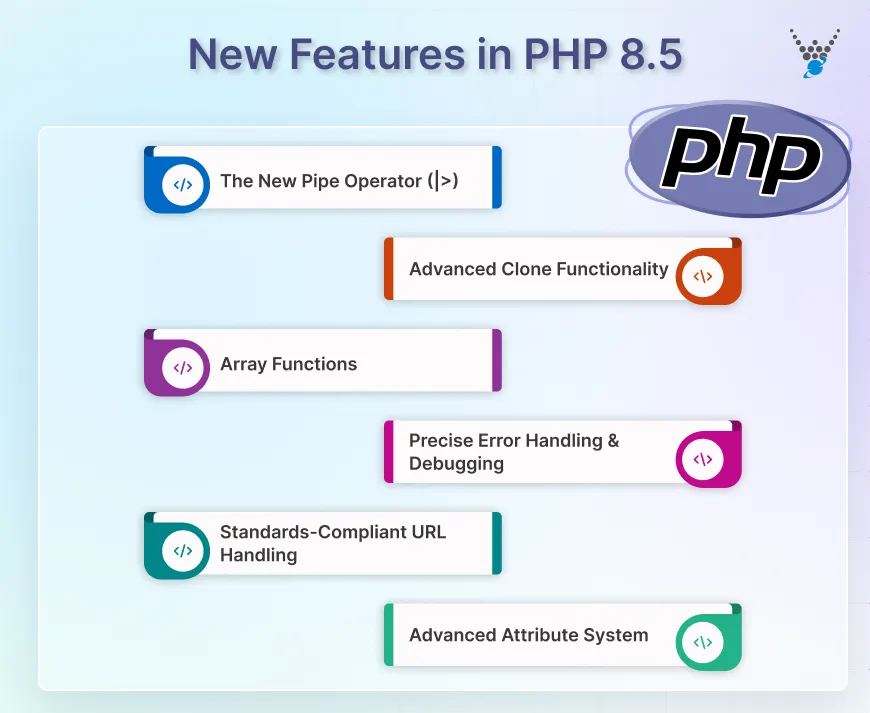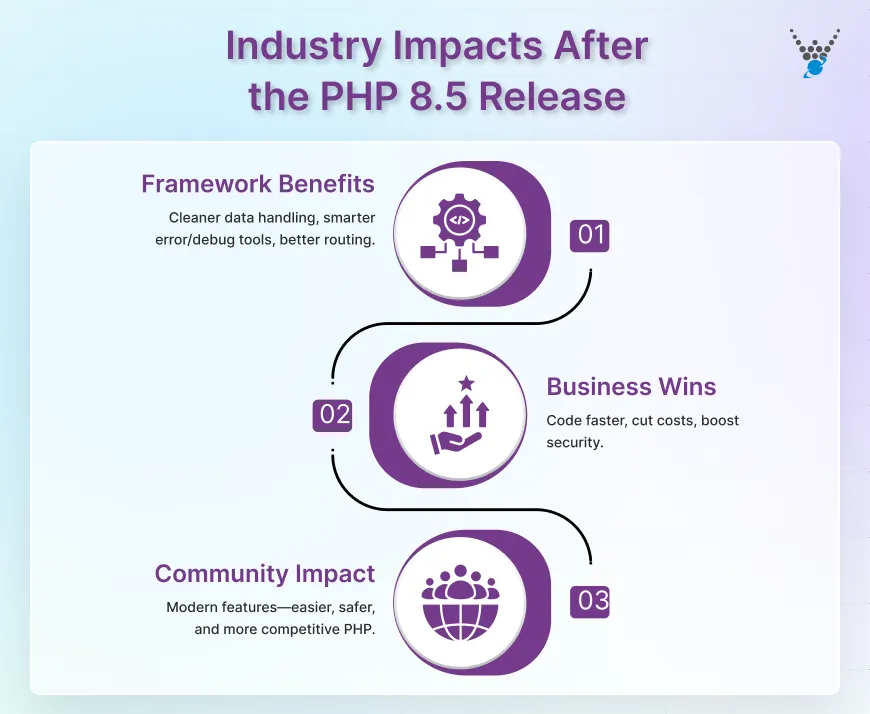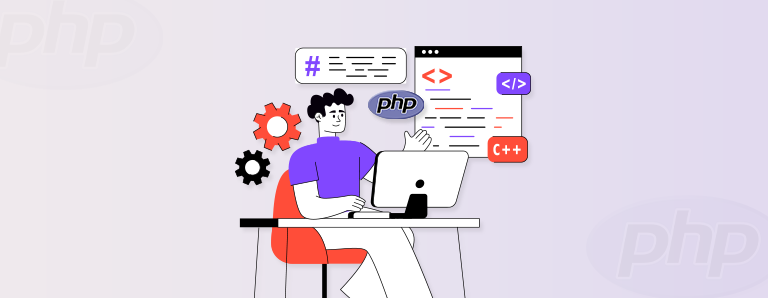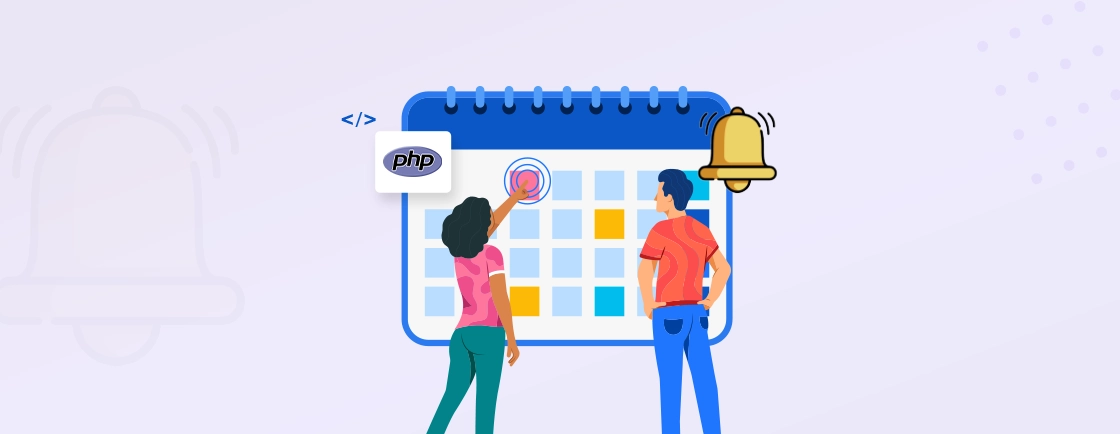Quick Summary
PHP 8.5 is scheduled for release on November 20, 2025, and brings a mix of major new features and smaller quality-of-life improvements. While the upgrade is not expected to be difficult for most users, it is recommended to wait for the first bug-fix release (8.5.1) before updating production environments. Check out all you need to know about the PHP 8.5 update before release.
Table of Contents
PHP 8.5 is a big leap in PHP’s web development industry. The much-awaited pipe operator and improved debugging will change how developers build and maintain code in this edition. To prepare for PHP 8.5, this article covers new features, deprecations, performance updates, and migration options. So, let’s begin!
What is the Release Date of the PHP 8.5 Version?
The general availability (GA) release date for PHP 8.5 is November 20, 2025.
Previously, the history of PHP 7–8 upgrade revolutionized web development. PHP 7 improved efficiency, whereas PHP 8 came with union types, attributes, and the JIT compiler. Next, PHP 8.1 added enums and readonly properties, and PHP 8.2 added DNF types and readonly classes. PHP 8.3 and 8.4 added property hooks and asymmetric visibility, continuing this pace.
PHP 8.5 will be popular among developers for many reasons. This release introduces game-changing technologies like the pipe operator and error handling to improve developer experience. PHP 8.5 prioritizes intuitive code and rapid debugging over big architectural changes.
What are the New Features in PHP 8.5?

1. The New Pipe Operator (|>)
The pipe operator is this release’s most anticipated feature. This new-age programming concept helps in left-to-right function chaining, improving readability and maintainability. The pipe operator makes nested function calls elegant and sequential.
// Using PHP 8.5 pipe operator
$result = " Hello World "
|> strtolower(...)
|> trim(...)
|> ucfirst(...);
Pipe operator advantages are:
- The compiler converts pipes at compile-time, thus eliminating runtime overhead.
- Better readability and sequential operations are clearer.
- Allows graceful function composition in functional programming
- Debugging benefits like isolating and testing each step.
The pipe operator works with functions, methods, closures, and invokable objects. It doesn’t support by-reference parameters and requires each callable to receive one parameter.
2. Advanced Clone Functionality (Clone With)
This banger clone with syntax simplifies readonly object work and tasks involving PHP and regular expressions in this release. This feature solves a major issue with immutable value objects and readonly properties.
readonly class User {
public function __construct(
public string $name,
public string $email,
public int $age
) {}
public function withAge(int $newAge): self {
return clone($this, ['age' => $newAge]);
}
}
This addition simplifies immutable object patterns by making clone act as a function that receives an optional list of property overrides while retaining the benefits of the __clone() magic method and property hooks.
3. Array Functions
The array_first() and array_last() in PHP 8.5 fill a long-standing gap in array capabilities. These supplement PHP 7.3’s array_key_first() and array_key_last().
$users = ['Alice', 'Bob', 'Charlie'];
$first = array_first($users); // 'Alice'
$last = array_last($users); // 'Charlie'
// Works with associative arrays
$scores = ['alice' => 95, 'bob' => 87];
$first_score = array_first($scores); // 95
These functions return null for empty arrays and enable direct access to array values without key manipulation or numerous function calls.
4. Increased Error Handling and Debugging
Fatal error backtraces assist debugging. Previously, fatal errors gave very little information, making troubleshooting difficult. The new fatal_error_backtraces INI directive (enabled by default) gives entire fatal error stack traces.
// Before PHP 8.5
Fatal error: Maximum execution time exceeded in script.php on line 8
// PHP 8.5 with backtraces
Fatal error: Maximum execution time exceeded in script.php on line 8
Stack trace:
#0 script.php(12): processLargeData()
#1 script.php(20): handleRequest()
#2 {main}
PHP 8.5 adds get_error_handler() and get_exception_handler() utilities for handler introspection. This eliminates the requirement for workarounds to access active handlers.
5. Standards-Compliant URL Handling
This release comes with the internet-standard URL handling classes: Uri\Rfc3986\Uri and Uri\WhatWg\Url. These readonly classes replace parse_url() with compliant parsing and execution of queries according to high standards.
$uri = Uri\Rfc3986\Uri::parse('https://example.com/path?query=value');
$modified = $uri->withHost('newdomain.com');
$equivalent = $uri->isEquivalent($other_uri);
The classes resolve relative URLs, extract components, and handle Unicode properly using punycode, fixing PHP’s URL handling difficulties.
6. Advanced Attribute System
Multiple major changes to PHP 8.5 expand the attribute system:
- Constant attributes: One constant per statement can now have characteristics.
#[Deprecated]
const OLD_API_URL = 'https://old-api.example.com';
#[ApiEndpoint('v2')]
const NEW_API_URL = 'https://api.example.com/v2';
- #[NoDiscard] Attribute: This feature prevents return values from being ignored, catching frequent issues.
#[\NoDiscard]
function calculateTax(int $amount): int {
return $amount * 0.08;
}
// This will emit a warning
calculateTax(100);
// This is correct
$tax = calculateTax(100);
- #[Override] for Properties: Compile-time validation will be possible with the Override attribute for properties.
Accelerate your project’s success and stay ahead with the latest PHP features. Explore our custom PHP development services to get started.
Deprecations and Removed Features
1. Language and Syntax Deprecations
To increase consistency and security, PHP 8.5 deprecates numerous old language constructs:
In current PHP, semicolons are replaced by colons to end case statements.
Discontinue non-standard cast names:
- Use int instead of integer
- Use float instead of double
- Use bool instead of boolean
- Use string instead of binary
The explicit shell_exec() function replaces shell backticks. This will help in further improving code readability and security.
Serialization magic techniques __sleep() and __wakeup() are deprecated as well. So, migration to PHP 7.4’s __serialize() and __unserialize() methods is now much appreciated.
2. INI Directive Changes
Some INI directives are deprecated:
PHP 8.5 deprecated report_memleaks. Since memory leaks are always notified in debug builds and have no effect in production.
register_argc_argv is deprecated as well due to security concerns in HTTP-based SAPIs. Here, it can define $argv and $argc from query strings. Runtime instability and crashes prevent disable_classes from being used.
3. Impact on Backward Compatibility
These deprecations warn in PHP 8.5 before being removed in PHP 9.0, as per PHP’s policy. Developers have enough time to upgrade their codebases while retaining stability.
Assessment of migration impact:
- The majority of deprecations concern rare features.
- Security deprecations increase code safety.
- Standard equivalents exist for all deprecated functions.
Performance Improvements in The New PHP 8.5 Version
1. Memory Management Optimizations
PHP 8.5 maintains performance optimization from earlier versions, ensuring the future of PHP development remains competitive. It improves memory management and error handling, although not as much as PHP 8.0’s JIT compiler.
Recent benchmarking shows that PHP versions 8.2, 8.3, and 8.4 perform similarly, with PHP 8.5 following suit. Major performance overhauls are replaced with targeted optimizations.
2. Error Handling Performance
Though fatal error backtraces may seem like a performance issue, the implementation is optimized to minimize overhead. This functionality only activates after fatal errors, preserving regular execution performance.
3. JIT Compiler Refinements
The PHP 8.0 JIT compiler has been slightly improved in this release. JIT optimizations benefit CPU-intensive activities, although WordPress may not improve.
Considerations for performance:
- Pipe operator runs without overhead.
- Fatal error backtraces affect error cases exclusively.
- All apps benefit from memory management improvements.
- JIT improvements aid calculation.
Comparison of PHP 8.5 with Previous Releases
PHP 8.2, 8.3, and 8.4 perform similarly for common online applications, according to Tideways and other performance testing organizations. PHP 8.5 prioritizes developer experience. Performance will also be increased by approximately 10%.
Previously, the performance boost from PHP 7.4 to PHP 8.0 was (~5%), but newer versions maintained stability with many enhancements.
PHP 8.5 vs PHP 8.4 vs PHP 8.3 Comparison
| Feature Category | PHP 8.3 Support | PHP 8.4 Support | PHP 8.5 Support | Key Improvements |
|---|---|---|---|---|
| Language Features | Union types, Intersection types | Property hooks, Asymmetric visibility | Pipe operator, Clone with syntax | Revolutionary function chaining |
| Array Functions | array_key_first/ last | Limited improvements | array_first(), array_last() | Direct value access |
| Error Handling | Basic error reporting | Improved error messages | Fatal error backtraces, Handler introspection | Complete stack traces |
| Attributes | Class/method attributes | #[Deprecated] for classes | Attributes on constants, #[NoDiscard], #[Override] | Comprehensive validation |
| URL Handling | parse_url() limitations | No major improvements | RFC 3986 & WHATWG URL APIs | Standards-compliant parsing |
| Developer Tools | Basic CLI options | Some debugging improvements | php –ini=diff, PHP_BUILD_DATE | Enhanced debugging tools |
| Performance | JIT optimizations | Steady performance | Incremental improvements | Memory and error handling optimization |
PHP 8.5 is more useful than older versions, which were more focused on type safety and visibility. These new ideas, along with URL APIs that follow standards and better debugging tools, help developers write code that is cleaner, more reliable, and easier to maintain. It’s basically an update that puts developer experience and future-proofing application architecture first.
PHP Migration Tips After the 8.5 Version Update
1. Pre-Migration Assessment
Use automated tools to assess compatibility before migrating to PHP 8.5. We recommend using PHPStan at the maximum level to find issues, while Rector automates PHP 8.5 code refactoring.
# Essential PHP migration tools
composer require --dev rector/rector phpstan/phpstan
vendor/bin/rector process src --dry-run
Laravel 11+ supports PHP 8.5 updates like the pipe operator. For better error handling, Symfony 7.0+ uses PHP 8.5. WordPress plugin compatibility must be checked before the PHP 8.5 upgrade.
2. Step-by-Step PHP 8.5 Migration Process
- Development Environment: Make Docker containers with PHP 8.5 release candidates for safe testing. Staging environments should match production.
- PHP 8.5 Deprecations: Use shell_exec() instead of backticks, update cast names (integer → int, boolean → bool), and update__sleep() methods to modern ones in PHP 8.5.
- Update Configuration: Enable debugging fatal_error_backtraces. Identify environment configuration differences with php –ini=diff. PHP 8.5 migration is smooth with minimal downtime.
- Essential tools: Rector, PHPStan, and Composer are important for automated refactoring, static analysis, and dependency management. PHP 8.5 migration is more reliable and efficient with these tools.
3. Testing Strategy
For Automated Testing:
- Unit tests with PHPUnit
- Integration tests for API endpoints
- Performance benchmarking
- Security vulnerability scanning
For Manual Testing:
- User interface functionality
- Third-party integrations
- Error handling scenarios
- Production-like data testing
Industry Impacts After the PHP 8.5 Release

Framework Benefits
The enhanced Eloquent model and value object cloning, and the pipe operator for elegant data transformations will benefit Laravel developers. Error handling can improve Symfony debugging, and URL classes can improve routing and URL generation. Fatal error backtraces simplify plugin and theme debugging, reinforcing what PHP is used for in modern CMS platforms.
Business Advantages
- Development Efficiency: New features reduce manual coding mostly. And speed debugging + lowering development costs would help in releasing quickly.
- Code Maintainability: The pipe operator and a few attributes make the code self-documenting and easy. This would reduce long-term maintenance costs.
- Security Improvements: Deprecating backticks and problematic INI directives will improve application security.
Community and Ecosystem Growth
Developer experience draws new developers to the language and retains experienced developers who value modern programming paradigms. PHP competes with other modern languages due to its standards compliance (URI handling) and functional programming (pipe operator). If you want to upgrade, migrate, or optimize your PHP website for version 8.5, connect or hire PHP developers for consultation and successful implementation.
Conclusion
PHP 8.5 prioritizes developer experience and code quality over radical changes. Fatal error backtraces will save PHP developers countless debugging hours, and the pipe operator will change function composition.
The main takeaways:
- The pipe operator introduces zero-runtime functional programming patterns.
- Better cloning simplifies immutable object patterns.
- More efficient debugging improves development.
- URL handling that meets standards fixes longstanding issues.
- A complete attribute system improves code documentation and validation.
Deprecations reduce legacy features and simplify migration. Removal of insecure or problematic functionality improves PHP security and code consistency.
Upgrades are advised for developers and businesses. The updates boost code quality, debugging, and maintainability. Migration is easy for most applications using automated tools like Rector and PHPStan.
We recommend developers test release candidates and plan migrations. The PHP community’s innovation ensures PHP’s future dominance in web development.
FAQs
When is PHP 8.5 expected to be released?
PHP 8.5 will be released on November 20, 2025, as per the PHP release cycle. The release is tested in alpha, beta, and other relevant phases.
What are the major new PHP 8.5 features?
The pipe operator (|>) for function chaining, immutable object clone syntax, array_first() and array_last() functions, fatal error backtraces, and standards-compliant URL handling classes are the main PHP 8.5 features.
Which functions or features will be deprecated in PHP 8.5?
Backticks for shell execution, __sleep() and __wakeup() methods, non-standard cast names, semicolons after case statements, and INI directives like register_argc_argv and report_memleaks are deprecated in PHP 8.5.
How can I prepare my existing PHP projects for 8.5?
To prepare for the PHP 8.5 upgrade, use Rector and PHPStan. One can test in IDEs, check dependencies, fix deprecation warnings, and update configuration files as well. For better debugging, enable fatal_error_backtraces.
Will PHP 8.5 improve performance?
Memory management and error handling improve slightly in PHP 8.5. This release maintains PHP 8.x’s performance trend with targeted optimizations, unlike PHP 8.0’s JIT compiler.
Accelerate Web Development with PHP 8.5
Leverage advanced error handling, pipe operator, and standards-compliant URL handling to boost productivity.





